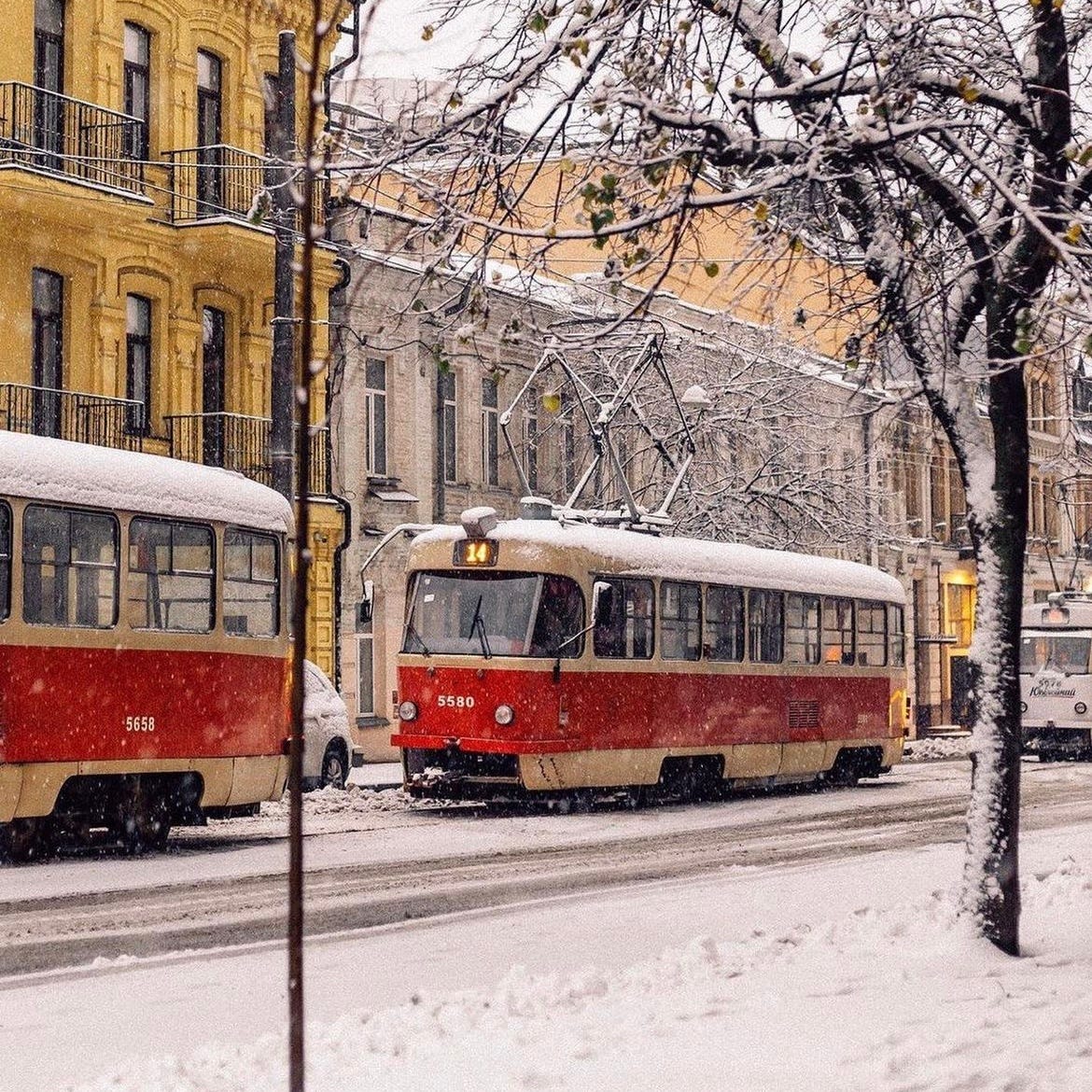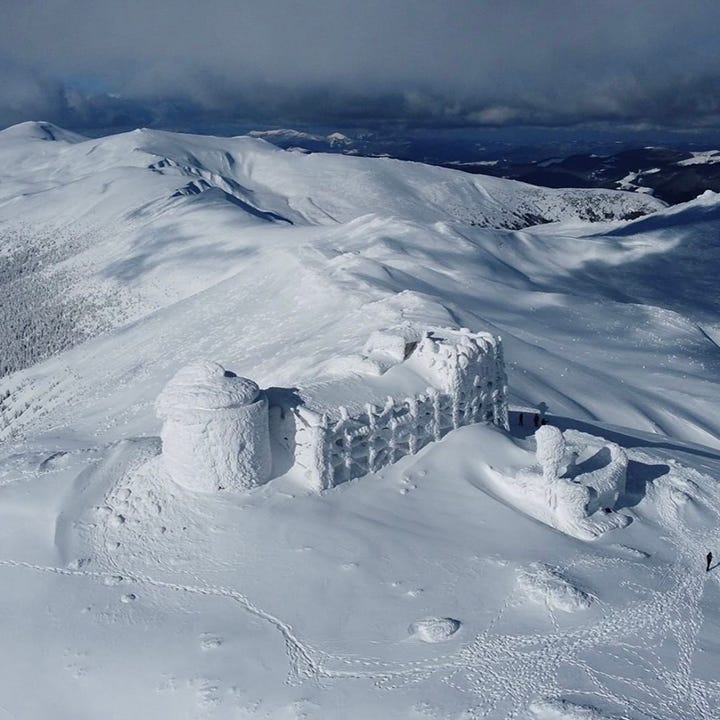Before immigrating to the U.S., I spent lots of time in Ukraine. While I was mesmerized by the beautiful nature and cities, Ukrainian people were always the reason why I was drawn to this country and was coming back again and again. I didn’t feel as much at home in the place where I grew up as I felt at home in Ukraine. No matter where I went, I’ve never felt like a stranger but as a part of a family.
I remember how I once had to spend 6 hours in Chernihiv at night, waiting for the bus to Kyiv. It was one of the coldest winter nights, and I was sitting in the middle of the bus station, wrapped in several scarves and wearing two pairs of woolen socks. Suddenly, a few older women appeared. They were chatting and laughing, and the station's atmosphere immediately changed. They had big thermoses with hot tea and bags with Ukrainian stuffed buns (pyrizhky), which they offered to people for free. They went around the station and made sure everyone was warm and had a cup of tea. When they stopped by me, I asked why they were doing that. The women said that every night, they came to the station to bring hot tea and food to the homeless people who were sheltering from the cold, as well as to travelers like me. They said: “It doesn’t cost us anything. We don’t want anyone to freeze during these cold winter nights,” and handed me a cup of tea and a pastry.
In February 2022, Russian soldiers came to Chernihiv from the territory of Belarus. Shortly after, they encircled the city, all the time relentlessly bombing it and committing atrocities in the villages around it. More than 300,000 residents of Chernihiv were cut off from the world. They didn’t have electricity and heat in freezing temperatures as Russians bombed the pipelines and power plants. Many people were killed. Many didn’t survive the blockade. I couldn’t stop thinking about the women I met at the bus station. The women who fed the frequent travelers from Belarus, like myself, and made sure they were warm. The women whose city was invaded and bombed from the Belarusian territory and who were left to freeze and die. That’s how they were thanked for their hospitality and kindness. I still can’t comprehend the scale of evil unleashed from Belarusian territory. I know that as long as I live, I’ll be doing everything to be deserving of a cup of tea from those women.
In my early 20s, I once hitchhiked across Ukraine with my friend. Hitchhiking may sound weird to Americans, but a decade ago, it was very popular in Europe, and the youth traveled like that a lot, including me. During that trip, I made lots of Ukrainian friends and had many stories and adventures. One day, we couldn't stop a car for more than an hour. It was November, and we quickly got cold. When we almost lost hope, a truck driver stopped by. My friend and I were both young girls, and we had heard scary stories about truck drivers, so we were very hesitant at first. But the weather was getting worse, so we jumped inside. The truck was going to Odesa, the city we were headed to, and we were glad we didn’t have to change cars. During the long hours of driving, we talked a lot, and the driver opened up about his life. He shared that he was in prison for killing a person, and me and my friend instantly got tense. He continued that he was 16 years old and got into a fight together with his friends. One of the people died, and he went to prison for more than ten years. He served his time, and when he got out, all his friends abandoned him, he didn’t have any education, and he couldn’t find a job. He started to drink and almost lost himself, but his older sister persuaded him to learn how to drive and become a truck driver. With time, he began earning good money, met a woman he fell in love with, and built a family. He was a good guy who had a very bad start in life, and I felt guilty that I instantly judged him without knowing the whole story.
We were a few hours away from Odesa when suddenly, about a dozen cars before us, another truck rolled over. Several cars couldn't stop in time and crashed into it. The whole highway was blocked. Emergency services took the injured people to the hospital, but the cars were left. At first, we thought they would be towed, but as hours passed, the news spread that the road wouldn’t be cleared until morning. It was getting darker, and we had no choice but to spend a night in a truck together with the driver. He shared his meal with us – a big loaf of bread and a huge piece of cured pork. He didn’t have a knife or plates, and we were just biting it in turns. The driver let us take his bed while he stayed in the seat. I remember the cold night, the wind howling outside, the lights glowing on the dashboard, the radio playing old songs, and the driver quietly talking to his family on the phone while my friend and I were lying together on a tiny truck bed under a pile of blankets. The highway was cleared in the morning, and we eventually made it to Odesa. We all got emotional while saying goodbye, and the driver said that he would never forget us and invited us to his native village if we were ever nearby. When we came to Odesa, we saw the truck crash being discussed all over the news, and we thought how lucky we were to ride in a different car. We also thought that we were very lucky to meet that driver, who was willing to sacrifice his comfort and who spent a night in the cold driver’s seat, shared his meal with us, and safely brought us to the city. He also taught us a lesson not to judge a person without knowing them.
About a year later, I had a visa interview at the American embassy in Kyiv. I felt nauseous from anxiety, as I knew that it was the biggest step in my life that would change everything. The person before me left in tears – their visa was denied. I couldn’t breathe when it was my turn to come to the window. When the consul said my visa was approved, I couldn’t believe it. I was on a cloud. As I was leaving the embassy, I noticed a photo on the wall: a Ukrainian mountain, Pip Ivan, covered in snow. I climbed that mountain in a huge blizzard a month before that, and as I looked at that photo, I thought it was a sign that I could accomplish anything. I went outside. It was an early winter morning in Kyiv. The streets were busy. People and cars were running in all directions. I was alone, but I didn’t feel alone. I walked the streets and thought about how I loved that city and its people. I was incredibly excited to see America, but I also thought about how deeply I would miss Ukraine.
I didn’t know that soon after coming to the U.S., I would meet a guy from Kyiv, fall in love, get married, and forever connect my life with Ukraine. I didn’t know that the Russians would start a full-scale invasion and kill thousands of Ukrainians. I didn’t know that my Ukrainian friends would have to become soldiers or flee their homes. I didn’t know that the Ukrainian cities and villages I visited would be bombed and mutilated. I didn’t know that all the people I met would face such unspeakable evil and trauma. I didn’t know that Ukrainians would have to fight for survival while at the same time proving to the world that they deserve to live and be free. I didn’t know any of that. But I knew I loved that country and its people, and they would always have a special place in my heart.
Please continue standing with Ukraine. Your help and support is needed now more than ever.
Warmly,
Darya
Email: daryazorka@substack.com
Follow me on Instagram
Follow me on Twitter
Shop my art on Etsy
Watch the “20 Days in Mariupol” documentary
Watch Frontline PBS documentaries on Ukraine
Donate to help Ukraine: UKRAINE DONATION GUIDE 2023






I found your article moving. Even though my father was Ukrainian, I don't know Ukraine, because I've never been there. However, I can say the Ukrainians I meet are warm-hearted people. I like spending time with them.
One of the newcomers I met at my church is from Chernihiv. Most Ukrainian-Canadians have roots in Halychyna and Bukovina, but the people who have arrived since the invasion are from all over the country. I've met a number of people from Kyiv as well as many other places including Donbas.
Thank you Darya for sharing such a moving and interesting story. This is my favorite.